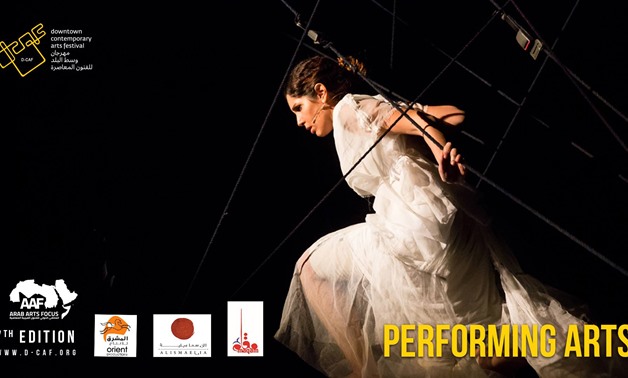
Aysha-Official Facebook Page
CAIRO – 1 April 2018: “Art has a great healing impact, and the play ‘Aysha’ could reflect the suffering of people with anxiety attacks and what they cannot speak up or express,” said director and actor Dalia Kholeif, who told a highly personal tale of pain in the show presented at D-CAF on March 24 and 26.
Presented for the first time in December at Jesuit School, the show tackles an issue spread among many when they live in the past for fear of what may come in the future and what other people think, feel overanxious of losing their beloved ones, and suffer from Obsessive-Compulsive Disorder (OCD).
This is the first time for her to do a whole show starting from writing to directing and acting, referring that the writing process, based on her own experience, took four years, Kholeif told Egypt Today.
“I named the main character Aysha (she is alive) to stress that she is alive; but deep down inside, she is dead, as when people see you they would imagine that you are the happiest person. However, this is contrary to the reality,” she referred.
 Aysha show- by Egypt Today/Marina Gami, March,26,2018
Aysha show- by Egypt Today/Marina Gami, March,26,2018
During the show, Kholeif could really express in her act what it is like to be one of those suffering from anxiety attacks, have overwhelming fear, think too much and overanalyze things, avoid certain situations and crowded places, and instead of feeling relaxed in between panic attacks, feel anxious and tense for having future panic attacks.
“Through the show I want to make those people know that you are not the only ones, and while you believe that that your case is the worst, there are much worse cases. The others who do not have this sickness, I call them not to judge the others from their external appearance and to understand what those people pass by.”
 Aysha show- by Egypt Today/Marina Gami, March,26,2018
Aysha show- by Egypt Today/Marina Gami, March,26,2018
The monodrama show reflects what is going on in Aysha’s mind and her chains that prevent her from dealing with other people, with her endless sleepless nights, annoying thoughts, creeping anxiety, continuous palpitations and fast heart beats.
“The whole show drains me psychologically and physically. However, the most difficult part for me is the panic attacks, as I do not act them; I recall them from my experience with the fast heartbeats, chest pains, sweating and choking feeling.”
The set with the voiceover resembles her running conversation in her head about her panic attacks, and the chains preventing her from enjoying her life and causing her internal struggle.
“For me, the custom represents all of Aysha’s problems and worries, and how people judge her from the outside without knowing her internal struggle.”
She remarked that the play was open-ended, as she wants that every person would guess and elaborate the end in accordance with his experience, without imposing her own one.
Kholeif graduated from the American University in Cairo with a degree in theater. She mentioned that since she took scenography workshops, her understanding of theater has changed, as she learned that each and every tool, music and custom in theater is an integral part of the whole show.


Comments
Leave a Comment